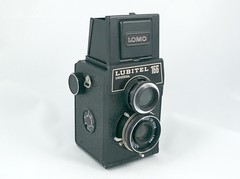Difference between revisions of "Lubitel 166 Universal"
(images added) |
|||
| Line 1: | Line 1: | ||
{{stub}} | {{stub}} | ||
| + | {{Flickr image | ||
| + | | image_source=http://www.flickr.com/photos/mikeasaurus/2120766858/in/pool-camerapedia/ | ||
| + | | image=http://farm3.static.flickr.com/2175/2120766858_157eda2398.jpg | ||
| + | | image_align=right | ||
| + | | image_text=<small>by Chronoguard</small> | ||
| + | }} | ||
The '''Lubitel 166U''' was made by [[Lomo]] in Leningrad (now St. Petersburg), Russia. | The '''Lubitel 166U''' was made by [[Lomo]] in Leningrad (now St. Petersburg), Russia. | ||
| − | The Lubitel is the poor man's twin lens reflex camera. Being made of plastic, it is sometimes lumped into the toy camera category, but it does have a glass lens and other features like several apertures and shutter speeds. Despite the apparent ability to "control" this camera, I have to admit that this isn't my favorite machine. Although bright, the screen is really hard to focus | + | The Lubitel is the poor man's [[TLR|twin lens reflex]] camera. Being made of plastic, it is sometimes lumped into the toy camera category, but it does have a glass lens and other features like several apertures and shutter speeds. Despite the apparent ability to "control" this camera, I have to admit that this isn't my favorite machine. Although bright, the screen is really hard to focus. |
| − | |||
| − | |||
| + | {{Flickr image | ||
| + | | image_source=http://www.flickr.com/photos/source/318820677/in/pool-camerapedia/ | ||
| + | | image=http://farm1.static.flickr.com/127/318820677_170c2d59a1_m.jpg | ||
| + | | image_align=left | ||
| + | | image_text=Viewfinder open<br><small>by Source</small> | ||
| + | }} | ||
| + | It has a ground circle in the center and a small [[loupe|magnifying glass]] to help with the task, but the results don't seem worth the effort. You are almost better off estimating the distance Holga-style. But all-in-all, it is capable of taking pretty sharp photos, and if you are willing to put up with its idiosyncrasies, it can be a nice little camera. | ||
| + | {{br}} | ||
===specifications=== | ===specifications=== | ||
| Line 13: | Line 25: | ||
* Frame size: 56x56 mm or 56x42 mm (12 or 16 pictures per film respectively) | * Frame size: 56x56 mm or 56x42 mm (12 or 16 pictures per film respectively) | ||
* Lens: T-22 75 mm f/4.5 | * Lens: T-22 75 mm f/4.5 | ||
| − | * Shutter: leaf, manually cocked | + | * Shutter: [[leaf shutter|leaf]], manually cocked |
* Shutter speeds: 1/15 sec. to 1/250 sec. and B | * Shutter speeds: 1/15 sec. to 1/250 sec. and B | ||
* Aperture: f4.5 to f22 | * Aperture: f4.5 to f22 | ||
* Focusing range: 1.3 m to infinity | * Focusing range: 1.3 m to infinity | ||
| − | * Flash | + | * [[Flash sync]]h: cord, all shutter speeds |
| − | * | + | * [[Self-timer]]: mechanical |
* Film transport: manual | * Film transport: manual | ||
* Frame counter: none (two windows at the back for controlling frame numbers of both frame sizes) | * Frame counter: none (two windows at the back for controlling frame numbers of both frame sizes) | ||
* Double exposure safety: no | * Double exposure safety: no | ||
| − | * Tripod socket 1/4" | + | * Tripod socket: 1/4" |
Revision as of 02:30, 17 February 2009

|
| by Chronoguard |
The Lubitel 166U was made by Lomo in Leningrad (now St. Petersburg), Russia. The Lubitel is the poor man's twin lens reflex camera. Being made of plastic, it is sometimes lumped into the toy camera category, but it does have a glass lens and other features like several apertures and shutter speeds. Despite the apparent ability to "control" this camera, I have to admit that this isn't my favorite machine. Although bright, the screen is really hard to focus.

|
| Viewfinder open by Source |
It has a ground circle in the center and a small magnifying glass to help with the task, but the results don't seem worth the effort. You are almost better off estimating the distance Holga-style. But all-in-all, it is capable of taking pretty sharp photos, and if you are willing to put up with its idiosyncrasies, it can be a nice little camera.
specifications
- Type: TLR
- Manufacturer: LOMO
- Year of launch: 1980
- Film: 120 only
- Frame size: 56x56 mm or 56x42 mm (12 or 16 pictures per film respectively)
- Lens: T-22 75 mm f/4.5
- Shutter: leaf, manually cocked
- Shutter speeds: 1/15 sec. to 1/250 sec. and B
- Aperture: f4.5 to f22
- Focusing range: 1.3 m to infinity
- Flash synch: cord, all shutter speeds
- Self-timer: mechanical
- Film transport: manual
- Frame counter: none (two windows at the back for controlling frame numbers of both frame sizes)
- Double exposure safety: no
- Tripod socket: 1/4"